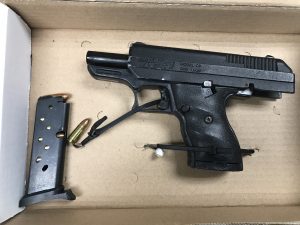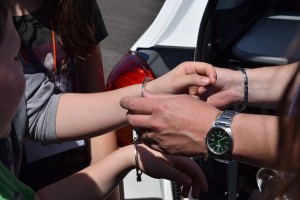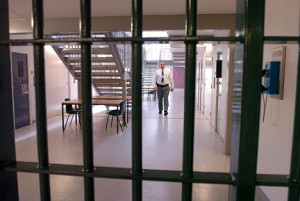 Montgomery County Police recently arrested a 17-year-old high school student for various firearm offenses after he was found in possession of a loaded 9mm handgun on the public school’s campus. The student, who lives in Bethesda, was charged with possession of a firearm by a minor, possession of a loaded handgun and possession of a dangerous weapon on school property. School security was tipped off by a fellow student, who apparently observed an object that looked like a gun in the defendant’s backpack while in the restroom. Montgomery County police officers confronted the suspect and ultimately performed a search that yielded the handgun. This all occurred around the same time that police were responding to two false bomb threats that locked other county schools down. Upon being arrested, the student was taken to the Montgomery County Detention Center and was held without bail. As a detained juvenile, his bail will likely be reviewed in two weeks if he is still in custody. In the meantime, he will be held in a secure juvenile facility. We are unable to track the progress of this case because the judiciary seals all juvenile cases from public view, but depending on his record and his representation, he may have a good chance at eventually facing trial in the juvenile court and avoiding an adult criminal record.
Montgomery County Police recently arrested a 17-year-old high school student for various firearm offenses after he was found in possession of a loaded 9mm handgun on the public school’s campus. The student, who lives in Bethesda, was charged with possession of a firearm by a minor, possession of a loaded handgun and possession of a dangerous weapon on school property. School security was tipped off by a fellow student, who apparently observed an object that looked like a gun in the defendant’s backpack while in the restroom. Montgomery County police officers confronted the suspect and ultimately performed a search that yielded the handgun. This all occurred around the same time that police were responding to two false bomb threats that locked other county schools down. Upon being arrested, the student was taken to the Montgomery County Detention Center and was held without bail. As a detained juvenile, his bail will likely be reviewed in two weeks if he is still in custody. In the meantime, he will be held in a secure juvenile facility. We are unable to track the progress of this case because the judiciary seals all juvenile cases from public view, but depending on his record and his representation, he may have a good chance at eventually facing trial in the juvenile court and avoiding an adult criminal record.
The student was charged as an adult because Maryland juvenile courts do not have original jurisdiction over gun crimes committed by defendants 16 or older. This includes all firearm offenses from misdemeanor possession of a firearm by a minor to felonies such as armed robbery and possession of a firearm in a drug trafficking crime. Other crimes that start in adult court include first degree assault, vehicle and boat offenses, robbery with a dangerous weapon and felony sex offenses. These cases may be transferred to juvenile court upon a motion that must be filed within 30 days. While a transfer motion is pending a detained juvenile defendant shall be held in a juvenile facility unless there is no space, and the Court finds the juvenile to be a danger. If the reverse waiver transfer motion is granted, the juvenile will immediately be scheduled for a detention hearing and may be released to his or her parents at that point.
Minors who are charged with gun offenses including misdemeanor unlawful firearm possession can, and often are, held in jail without bail in Maryland, which makes it extremely important to retain an experienced juvenile criminal defense lawyer. Judges from certain jurisdictions such as Baltimore City and Prince George’s County are less inclined to release juveniles with firearm charges due to the ongoing gun violence in the Baltimore and Washington D.C. metro areas. If your son or daughter has been arrested for a gun offense anywhere in the state, contact Maryland juvenile lawyer Benjamin Herbst 7 days a week for a free consultation. Benjamin specializes in juvenile gun crimes and represents clients in all jurisdictions from the Eastern Shore to Western Maryland. He has extensive experience representing juveniles charged with minor in possession of a firearm, robbery and first-degree assault. Benjamin has obtained the release of clients at numerous juvenile bail reviews and has prevailed in reverse waiver hearings for serious felony offenses such as carjacking and armed robbery. He fights tooth and nail to protect his client’s futures from intake hearing to trial and to make sure they are home with their families and not placed in a state program. Contact Benjamin anytime for a free consultation at 410-207-2598 to discuss the defenses that may be available in your child’s case.
 Criminal Defense Lawyer Blog
Criminal Defense Lawyer Blog









